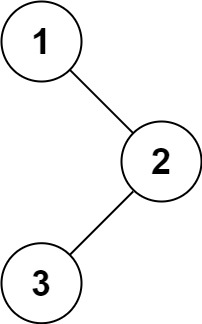Binary Tree Inorder Traversal
Problem
Given the root of a binary tree, return the inorder traversal of its nodes' values.
Example 1:

Input: root = [1,null,2,3] Output: [1,3,2]
Example 2:
Input: root = [] Output: []
Example 3:
Input: root = [1] Output: [1]
Constraints:
- The number of nodes in the tree is in the range
[0, 100]. -100 <= Node.val <= 100
Solution
/**
* Definition for a binary tree node.
* function TreeNode(val, left, right) {
* this.val = (val===undefined ? 0 : val)
* this.left = (left===undefined ? null : left)
* this.right = (right===undefined ? null : right)
* }
*/
/**
* @param {TreeNode} root
* @return {number[]}
*/
var inorderTraversal = function(root) {
if (!root) {
return [];
} else {
return [...inorderTraversal(root.left), root.val, ...inorderTraversal(root.right)];
}
};
Standard recursive (DFS) inorder traversal of a binary tree.
Follow-up
Recursive solution is trivial, could you do it iteratively?
Solution
/**
* Definition for a binary tree node.
* function TreeNode(val, left, right) {
* this.val = (val===undefined ? 0 : val)
* this.left = (left===undefined ? null : left)
* this.right = (right===undefined ? null : right)
* }
*/
/**
* @param {TreeNode} root
* @return {number[]}
*/
var inorderTraversal = function(root) {
const stack = [];
const res = [];
while (stack.length || root) {
while (root) {
stack.push(root);
root = root.left;
}
root = stack.pop();
res.push(root.val);
root = root.right;
}
return res;
};
Standard iterative (DFS) inorder traversal of a binary tree.